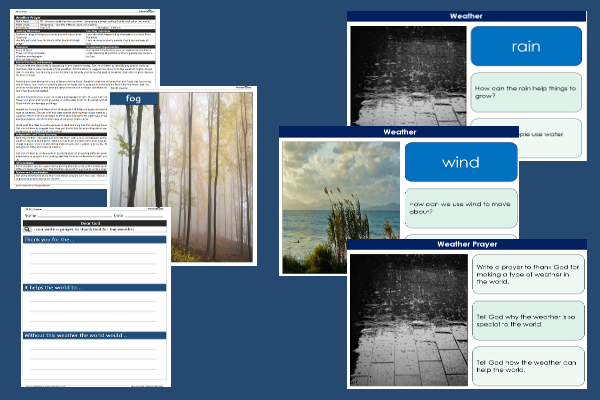Lesson Four – Weather Prayer

This religious education teaching pack for Key Stage One gets the children to choose a selection of vocabulary words to use when composing a prayer asking God to look after the world following a weather event.
The class can record the positive and negative impact that certain types of weather might have on the world and how to stay protected.
Download this teaching pack including a lesson plan, classroom activities and an interactive presentation to teach the children to choose a selection of vocabulary words to use when composing a prayer asking God to look after the world following a weather event
Activities in this teaching pack include display posters to identify and describe the problems and benefits of a specific type of weather and a template to compose and write a prayer to thank God for a type of weather to outline its problems and benefits.
The interactive presentation gets the children to explore how to choose vocabulary to use when composing a prayer asking God to look after the world.
This lesson is part of a religious education scheme of work to get the children to identify, describe and record the sequence of narrative events and special themes in the story from the Bible about Noah and the Ark. There are teaching activities for shared learning, differentiated worksheets to support independent learning and interactive presentations to introduce concepts and key skills.
-

Building Reports
Explore how to collect facts and information to work with when composing and presenting non-chronological reports about buildings that can be found in the local area
-

English Spelling, Punctuation and Grammar Assessment
Assess abilities in spelling, punctuation and grammar based on the National Curriculum programmes of study for Key Stage One
-

Twos, Threes and Fives
Investigate some of the calculation techniques that can be used when solving problems by dividing numbers into equal groups of twos, threes and fives with no remainders
-

Robot Movements
Practise selecting and using the correct vocabulary words to describe and control the position and movements of a robot character around a grid or other locations
